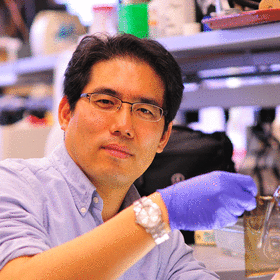

Jeongsik
Yong
Our research focuses on the reprogramming of gene expression during human pathogenic processes using biochemistry, and molecular and cellular biological approaches. We also integrate numerous Omics (Genomics, Transcriptomics, Proteomics and Metabolomics) approaches into our research to understand pathogenic processes at a global scale. Our current projects are mTOR-regulated transcriptome changes and their functional relevance in the control of alternative splicing and polyadenylation of mRNA, regulation of energy homeostasis, and the reprogramming of chromatin modifications.
Research interests
One way in which functional diversity is created in the human genome is through post-transcriptional gene regulation (PTGR). PTGR is mediated by non-coding RNAs and RNA-binding proteins (RBPs), and the modulation of this process is an important regulatory step in cell death or survival. Changes in many cancer transcriptomes are prevalent and thus, an important aspect of understanding the mechanism of human cancers is to investigate RNA metabolism. Generally, RNAs cannot function by themselves, and form active molecules in cells by binding to certain classes of proteins called RBPs. Importantly, RBP association with RNAs is functionally dynamic for the entire lifetime of RNAs. Therefore, RBPs are the key components in the regulation of transient and functional dynamics of RNAs, and RNPs are critical components in the study of cell- and tissue specific RNA metabolism. To date, there has been no systems biology approach that attempts to address the issue of analyzing the transcriptone and proteome of a given RNP simultaneously.
To overcome this, we developed an innovative systems biology approach that captures the molecular interactions in living cells and provides a genome-wide profiling of proteome and transcriptome. This ribo-proteomics strategy is a powerful tool that should be applicable for studies of all aspects of RNA metabolism in cell, tissue and animal models. Unlike other traditional crosslinking strategies, the ribo-proteomics strategy is more efficient and enables a high-throughput proteome analysis by mass spectrometry. The combination of this strategy with genome-wide analysis tools provides insights about global RNP dynamics and its effect on cancer biology in vivo.
Selected publications
JJ Gruber, SH Oljiniczak, J Yong, G La Rocca, G Dreyfuss, CB Thompson (2012) Ars2 Promotes Proper Replication-Dependent Hisone mRNA 3' End Formation. Molecular Cell. Volume 45. Issue 1. 87-98.
Education and background
PhD University of Pennsylvania School of Medicine
MS Seoul National University
Post-Doc University of Pennsylvania School of Medicine